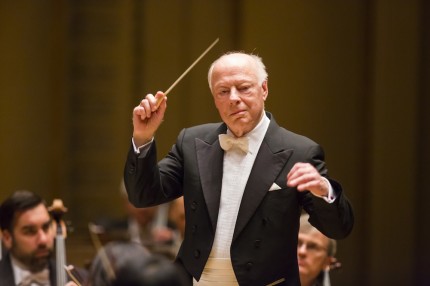Haitink’s sober integrity tames Mahler’s Seventh with CSO

It’s been nearly one-and-a-half years since Bernard Haitink’s last appearance leading the Chicago Symphony Orchestra. On Thursday night the CSO’s popular principal conductor emeritus was greeted with an enthusiastic ovation upon his entrance. There was just a single work on the program, Mahler’s Symphony No. 7.
Haitink turned 86 last month yet appears in impressively hale health. Apart from sitting briefly on a podium stool between movements, he conducted the epic work standing, with fine energy and customary concentration.
The Seventh is among the least often played of Mahler’s works in the genre. At five movements spanning over eighty minutes, the work can sprawl, even in the most veteran Mahlerian’s hands.
Haitink’s long experience in this repertoire and rock-ribbed musical integrity paid consistent dividends in Mahler’s epic work. With a sure architectural grip, he charted the long opening movement from the malign march of the opening bars through the contrasting episodes, the lilting second theme lyrical yet firmly held (and in tempo, as Mahler requests). With his textual fidelity and interpretive sobriety, the Dutch conductor’s eschewing of sentiment paid off in giving us a Seventh without special pleading, warts and all.
Still there were times when one wanted the sheer weirdness of the score to sound a bit more. The fleet tempo in the first Nachtmusik made for a more fluent and Viennese take on this strange “night patrol,” yet in the pastoral sections Mahler’s mountain cowbells sounded almost apologetic. Likewise in Nachtmusik II, Haitink mined an apt echt-Viennese style yet surely there’s a way to avoid schmaltz without entirely sacrificing some of the kitschy-serenade charm Mahler intended with his added guitar and mandolin. Haitink’s Central European approach also seemed to round off the sharp edges of the central scherzo, which should have more sense of danger and bite than Thursday’s jaunty traversal.
Even by Mahler’s standards, the finale can seem chaotic and ramshackle, switching gears and tempos frenetically and seeming to come to a false ending about five times too many. Haitink’s straight-faced approach made the closing movement seem even more bizarre by its lack of interpretive intervention. With no special pleading by whipping up speed or volume, the performance patiently made its way to a resounding and effective coda, even if the long journey to the final peroration left one more exhausted than exhilarated.
The CSO musicians clearly continue to hold Haitink in high regard and responded to the conductor with superb solo and corporate musicianship. Daniel Gingrich was consistently inspired in the tortuous solo horn passages, and David Herbert’s strong timpani work deftly kept the wayward finale on track. Other excellent individual highlights were provided by trumpet Christopher Martin, clarinetist Stephen Williamson, concertmaster Robert Chen and the entire percussion brigade.
Only the playing of guest flutist David Buck, from the Detroit Symphony Orchestra, disappointed, sounding wan of tone, underprojected and rather inhibited Thursday night.
The program will be repeated 8 p.m. Friday and Saturday and 7:30 p.m.Tuesday. cso.org; 312-294-3000.
Posted in Performances





Posted Apr 13, 2015 at 5:12 pm by Daniel Cohn
I agree completely with Mr. Johnson’s review of the performance and of Maestro Haitink’s excellent understanding of the score. The cow bells in the second movement were not as effectively bucolic as they are on a recording of the work that I have. I thought the scherzo could have been a bit more diabolical, and the last movement, which I don’t consider to be trivial in any way, could have sometimes been less inhibited, although Haitink made a convincing case for his approach. I much enjoyed the performance.